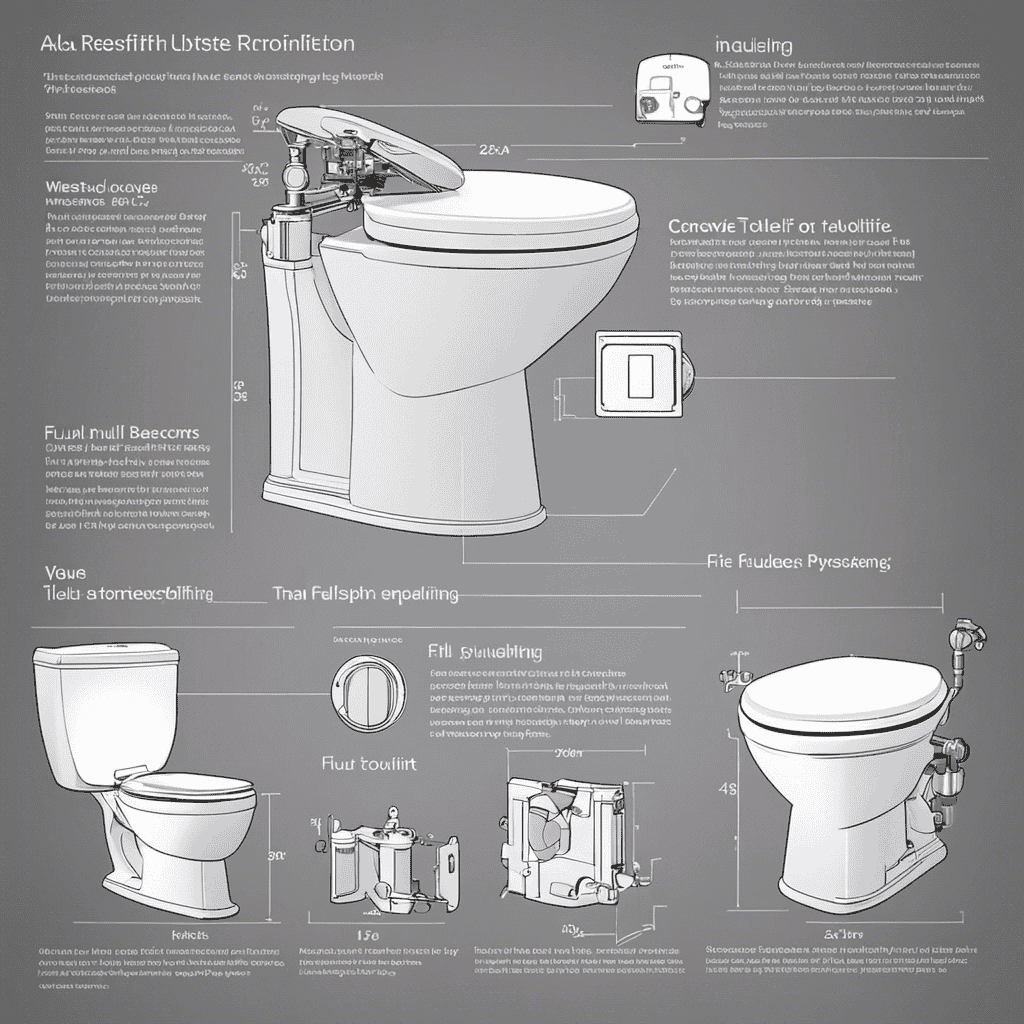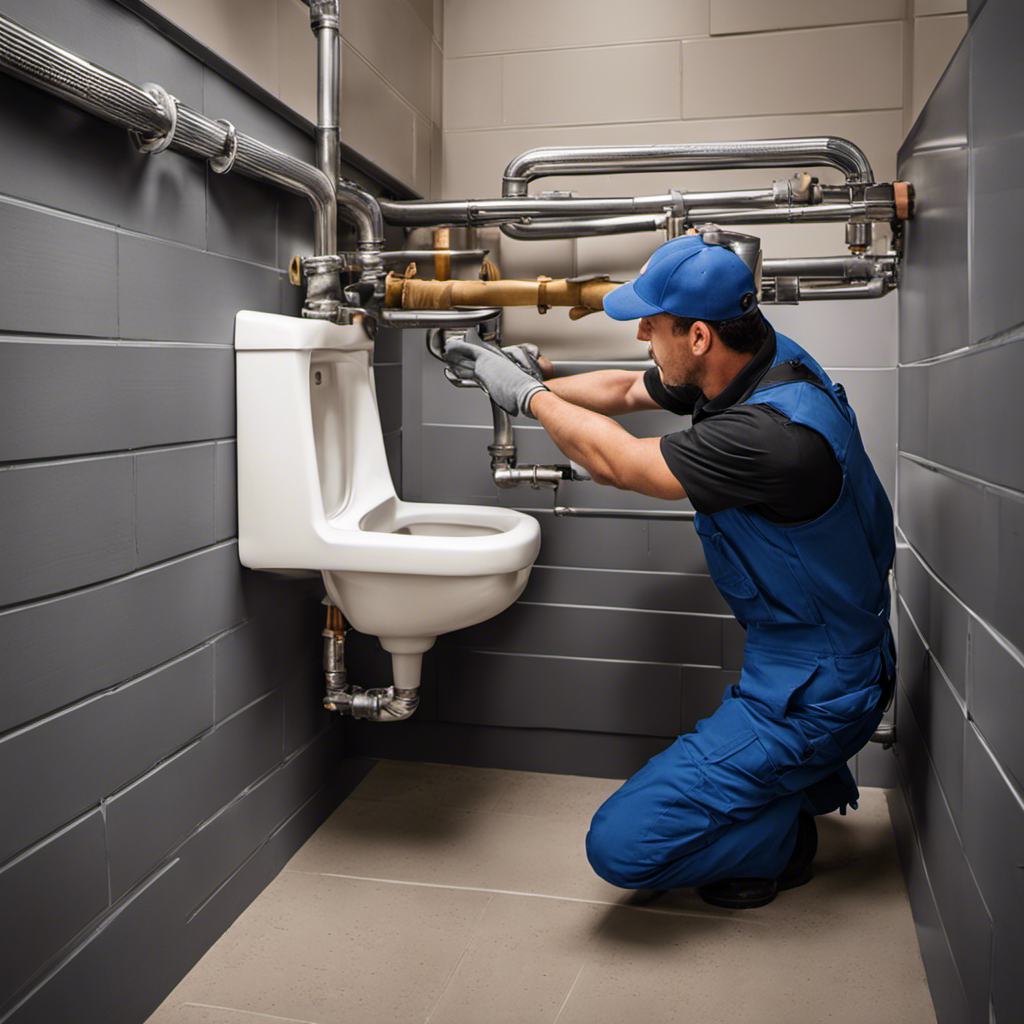As an eco-conscious individual, I strive to make a positive impact on the environment in every aspect of my life. That’s why I believe green living should extend to our sanitation practices.
In this introductory guide, I will show you how to redefine your approach to sanitation, transforming it into an eco-friendly and sustainable practice.
Just like a seed grows into a flourishing tree, let’s cultivate a lifestyle that nurtures our planet and serves future generations.
Key Takeaways
- Reducing energy consumption is crucial for a sustainable future.
- Using sustainable materials and alternatives promotes sustainability.
- Efficient water usage and proper waste disposal are important for sustainability.
- Composting reduces waste and promotes sustainability.
Understanding Your Carbon Footprint
I’m really starting to grasp the importance of understanding my carbon footprint and how it impacts the environment. Reducing energy consumption and minimizing our environmental impact are crucial steps towards a more sustainable future.
One way to achieve this is by being mindful of our daily activities and making conscious choices to reduce our carbon emissions. Simple actions like turning off lights when not in use, unplugging electronics, and using energy-efficient appliances can make a significant difference.
Additionally, opting for alternative transportation methods such as walking, cycling, or carpooling can help reduce our carbon footprint. By adopting these practices, we not only contribute to a healthier planet but also inspire others to do the same.
Together, we can create a greener and more sustainable world for future generations.
Selecting Sustainable Toilet Materials
Using sustainable toilet materials, such as recycled paper or bamboo, can significantly reduce the environmental impact of daily bathroom use. When it comes to toilet designs, it’s important to consider eco-friendly alternatives that prioritize sustainability.
Traditional toilet paper is often made from virgin wood pulp, contributing to deforestation and habitat destruction. By opting for recycled paper or bamboo toilet paper, we can help conserve forests and protect wildlife habitats. Recycled paper is made from post-consumer waste, reducing the demand for new materials. Bamboo, on the other hand, is a fast-growing and renewable resource that doesn’t require pesticides or fertilizers to grow.
By choosing these eco-friendly alternatives, we can make a positive impact on the environment and promote sustainability in our daily lives.
Now, let’s explore implementing regular maintenance techniques to further enhance our eco-friendly practices.
Implementing Regular Maintenance Techniques
When it comes to implementing regular maintenance techniques for eco-friendly sanitation, there are three key points to keep in mind: efficient water usage, proper waste disposal, and preventing plumbing issues.
By being mindful of our water consumption and using water-saving fixtures, we can reduce our environmental impact.
Proper waste disposal, such as composting or using septic systems, ensures that waste is handled in a sustainable manner.
Lastly, regular inspections and maintenance of plumbing systems can help prevent leaks and other issues, ensuring a more sustainable and efficient sanitation system.
Efficient Water Usage
I’ve been exploring ways to reduce my water consumption and have discovered that implementing regular maintenance techniques can significantly increase water efficiency. Here are some water-saving techniques that I’ve found helpful:
-
Install low-flow fixtures: By installing low-flow showerheads, faucets, and toilets, you can reduce water usage without sacrificing performance.
-
Fix leaks promptly: Even small leaks can waste a significant amount of water over time. Regularly check for leaks and repair them promptly to prevent water loss.
-
Collect rainwater: Consider installing a rain barrel or cistern to collect rainwater for outdoor use. This can help reduce reliance on municipal water sources for activities like watering plants or washing cars.
-
Practice smart irrigation: Use irrigation systems that are equipped with moisture sensors or timers to ensure that your plants receive just the right amount of water.
-
Adopt water-efficient habits: Simple habits like turning off the faucet when brushing your teeth or using a broom instead of a hose to clean outdoor areas can make a big difference in water conservation.
Implementing these techniques not only helps us reduce our water consumption but also contributes to the preservation of this precious resource.
Let’s all do our part in conserving water and creating a more sustainable future.
Proper Waste Disposal
Although it requires effort and awareness, implementing regular maintenance techniques for proper waste disposal is essential for creating a cleaner and healthier environment.
Waste segregation plays a crucial role in this process, as it ensures that different types of waste are properly sorted and disposed of. Communities can take the lead by organizing initiatives that promote waste segregation, such as setting up separate bins for recyclables, organic waste, and non-recyclables.
Educating residents about the importance of waste segregation and providing them with practical tips on how to do it effectively can make a significant difference. By working together, we can reduce the amount of waste that ends up in landfills and contribute to a more sustainable future.
Transitioning into the next section, let’s now discuss some practical steps to prevent plumbing issues.
Preventing Plumbing Issues
Fortunately, by implementing regular maintenance techniques, we can effectively prevent plumbing issues and avoid costly repairs. Here are some practical tips to ensure the smooth functioning of your plumbing system:
-
Keep an eye out for leaking faucets and promptly repair them. Even a small drip can waste gallons of water over time.
-
Avoid pouring grease or oil down the drains, as they can solidify and lead to clogged drains. Instead, let them cool and dispose of them in the trash.
-
Install drain strainers to catch hair, food particles, and other debris that can cause blockages.
-
Regularly clean your drains using a mixture of vinegar and baking soda to prevent build-up.
-
Insulate your pipes during colder months to prevent freezing and potential bursts.
By following these maintenance tips, you can save yourself from the inconvenience and expense of plumbing issues.
Now, let’s move on to the next topic of utilizing compost efficiently.
Utilizing Compost Efficiently
I have three practical tips on how to efficiently utilize compost in your garden. Composting benefits both your garden and the environment by providing natural nutrients and reducing waste. To make the most of your compost, follow these techniques:
-
Layering: Alternate between green and brown materials in your compost pile. Green materials include fruit and vegetable scraps, grass clippings, and coffee grounds. Brown materials include dry leaves, straw, and shredded paper. This balance helps create a healthy compost mix.
-
Turning: Regularly turn your compost pile to ensure proper aeration. This helps speed up the decomposition process and prevents odors. Use a pitchfork or compost turner to mix the materials thoroughly.
-
Moisture control: Keep your compost pile moist but not soggy. The ideal moisture level is similar to a damp sponge. Add water if it feels too dry, or add dry materials if it’s too wet.
By following these simple techniques, you can efficiently utilize compost in your garden and enjoy the benefits of nutrient-rich soil for your plants.
| Composting Benefits | Composting Techniques |
|---|---|
| Enriches soil | Layering |
| Reduces waste | Turning |
| Improves plant growth | Moisture control |
Promoting Environmental Awareness
As an eco-conscious individual, I believe that promoting environmental awareness is crucial in our efforts to protect our planet.
By educating ourselves and others about sustainable waste management practices and eco-friendly sanitation methods, we can make a positive impact on the environment.
From recycling and composting to reducing our water and energy consumption, there are numerous ways we can contribute to a greener future.
Sustainable Waste Management
Implementing a comprehensive recycling program in my community has significantly reduced the amount of waste that ends up in landfills. It’s amazing to see the positive impact we can make when we all come together to prioritize sustainable waste reduction.
Here are some innovative recycling methods that have been instrumental in our efforts:
-
Single-stream recycling: This convenient system allows residents to place all recyclables in one bin, making recycling easier and more efficient.
-
Composting: By turning organic waste into nutrient-rich soil, we not only reduce landfill waste but also create a valuable resource for gardening and agriculture.
-
Upcycling: Rather than throwing away items, we encourage people to find creative ways to repurpose them, reducing the need for new materials.
-
E-waste recycling: Proper disposal of electronic waste is crucial to prevent harmful chemicals from entering the environment.
-
Community education: By organizing workshops and events, we spread awareness about the importance of recycling and provide practical tips for sustainable living.
With our successful waste management practices in place, we can now move on to discussing eco-friendly sanitation practices that further contribute to a greener and healthier community.
Eco-Friendly Sanitation Practices
Using biodegradable cleaning products and installing water-saving fixtures are effective ways to implement eco-friendly sanitation practices and reduce our environmental impact.
Eco-friendly cleaning products are made from natural, non-toxic ingredients that break down easily, minimizing harm to the environment. Look for products that are labeled as biodegradable, phosphate-free, and cruelty-free to ensure their sustainability.
Additionally, water-saving fixtures, such as low-flow toilets and faucets, can significantly reduce water consumption. These fixtures use less water without compromising on performance.
By incorporating these practices into our daily lives, we can contribute to sustainable hygiene and protect our planet. Remember to also practice proper waste disposal, recycling, and conserving energy to further reduce our environmental footprint.
Together, we can make a difference and create a healthier, cleaner world for future generations.
Harnessing Renewable Energy in Sanitation
I can generate clean electricity by utilizing solar panels to power the sanitation system. This innovative approach not only helps reduce our carbon footprint but also provides a sustainable solution for energy consumption in sanitation. By using renewable energy sources such as solar power, we can make our sanitation systems more environmentally friendly.
Here are five benefits of harnessing renewable energy in sanitation:
-
Reduced reliance on fossil fuels: Solar energy reduces our dependence on non-renewable resources like coal and oil, helping to combat climate change.
-
Cost savings: By using solar panels, we can significantly reduce electricity bills and operational costs in the long run.
-
Increased resilience: Solar power provides a reliable and stable source of energy, ensuring uninterrupted sanitation services even during power outages.
-
Community empowerment: Implementing green energy solutions creates local job opportunities, promoting economic growth and empowering communities.
-
Environmental conservation: Utilizing renewable energy decreases harmful emissions, preserving our natural resources and protecting the environment for future generations.
Recycling Water Resources
One of the key benefits of recycling water resources is the significant reduction in water consumption, conserving this valuable resource for future generations. Water conservation is crucial for sustainable living, and one practical way to achieve this is through the implementation of greywater systems.
Greywater refers to the relatively clean wastewater from household activities such as bathing, laundry, and dishwashing. Instead of letting this water go to waste, it can be collected, treated, and reused for non-potable purposes like flushing toilets, watering plants, and cleaning.
Greywater systems not only minimize the strain on freshwater sources but also reduce the amount of wastewater that needs to be treated and discharged into the environment. By recycling water in this way, we can contribute to a more sustainable future and ensure that our water resources are preserved for generations to come.
Embracing Proper Waste Disposal
The importance of embracing proper waste disposal can’t be overstated, as it directly impacts the health of our environment and communities. As individuals, we’ve the power to make a difference by implementing simple yet effective practices.
Here are five practical tips to help us reduce waste and protect our planet:
-
Composting Techniques: Start composting at home by collecting fruit and vegetable scraps, coffee grounds, and yard waste. This organic material can be turned into nutrient-rich soil for gardening.
-
Reducing Plastic Waste: Minimize the use of single-use plastics by opting for reusable alternatives such as water bottles, shopping bags, and food containers. Additionally, choose products with minimal packaging whenever possible.
-
Separating Recyclables: Properly sort recyclables like paper, cardboard, glass, and plastic. This ensures that they can be processed and reused effectively.
-
Donating and Reusing: Before discarding items, consider donating them to local charities or thrift stores. Additionally, try repurposing items in creative ways to extend their lifespan.
-
Educating Others: Spread awareness about the importance of proper waste disposal by sharing these tips with friends, family, and social media followers.
Integrating Comprehensive Sustainability Practices
To truly make a lasting impact on the environment, we mustn’t only reduce waste but also integrate comprehensive sustainability practices into our daily lives.
One powerful way to do this is through composting. Composting benefits both the environment and our gardens by turning organic waste into nutrient-rich soil. By composting, we divert waste from landfills, reduce greenhouse gas emissions, and conserve water. It’s a win-win situation.
Another aspect of comprehensive sustainability practices is adopting sustainable cleaning methods. This means using environmentally-friendly cleaning products that are free from harmful chemicals. These products aren’t only safer for the planet, but also for our health. Additionally, we can reduce waste by using reusable cleaning tools like microfiber cloths and refillable spray bottles.
Frequently Asked Questions
What Are Some Practical Ways to Reduce Water Consumption in the Bathroom?
To reduce water consumption in the bathroom, I’ve learned some practical techniques.
Installing sustainable bathroom fixtures like low-flow toilets and faucets can make a big difference.
Taking shorter showers and turning off the water while brushing my teeth are simple habits that save water too.
Another tip is to fix any leaks promptly, as even a small drip can waste a significant amount of water over time.
These water-saving techniques are easy to implement and help promote a more sustainable lifestyle.
How Can I Incorporate Eco-Friendly Practices Into My Daily Cleaning Routine?
Incorporating eco-friendly practices into my daily cleaning routine is essential for reducing my environmental impact. By using eco-friendly cleaning products and adopting sustainable cleaning techniques, I can ensure that my home stays clean and healthy without harming the planet.
From using natural ingredients like vinegar and baking soda, to choosing biodegradable cleaning supplies, there are many practical ways to make a positive difference.
Are There Any Specific Eco-Friendly Products or Brands That You Recommend for Toilet Cleaning?
For eco-friendly toilet cleaning, there are several sustainable bathroom cleaning brands that I recommend. These brands offer eco-friendly toilet bowl cleaners that are effective at removing stains and odors without harmful chemicals.
Look for products that are made from natural ingredients, are biodegradable, and have minimal packaging. Some popular brands include Method, Seventh Generation, and Ecover.
What Are Some Common Misconceptions or Myths About Green Living and Sanitation?
Common misconceptions about green living and sanitation can hinder people from adopting eco-friendly practices.
One common myth is that green sanitation is expensive and inconvenient. However, the truth is that there are affordable and practical options available.
Another misconception is that green sanitation is less effective than traditional methods. In reality, eco-friendly products and practices can be just as effective, if not more so, while also benefiting the environment.
Embracing green sanitation not only helps preserve our planet, but also promotes a healthier and sustainable lifestyle.
How Can I Encourage My Community to Adopt More Sustainable Sanitation Practices?
To encourage my community to adopt more sustainable sanitation practices, I believe community engagement is key.
By organizing educational workshops and awareness campaigns, we can provide valuable information on eco-friendly alternatives and their benefits. I’d emphasize the importance of reducing waste, conserving water, and using natural products.
Practical demonstrations and success stories can inspire others to make positive changes.
Together, we can create a healthier and more sustainable environment for everyone.
Conclusion
In conclusion, embracing eco-friendly sanitation practices is like planting seeds of sustainability that bloom into a greener future.
By understanding our carbon footprint, selecting sustainable materials, and implementing regular maintenance techniques, we can create a harmonious relationship with the environment.
Utilizing compost efficiently, promoting environmental awareness, and harnessing renewable energy in sanitation further contribute to our efforts.
Recycling water resources and embracing proper waste disposal complete the picture of comprehensive sustainability.
Let’s join hands in shaping a cleaner and healthier world for generations to come.










